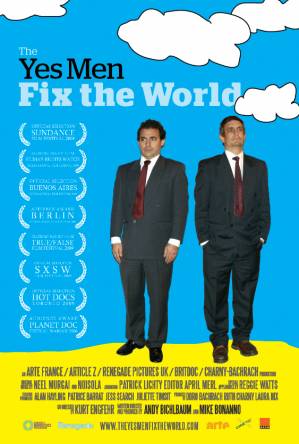The Yes Men fix the world. We ask what keeps them going?
 As the Yes Men - the thinking-person's Sacha Baron Cohen - see their latest film released in the UK, Netribution sneaks its way into a secretive underground political cell known only as 'Soho House' to find them out and learn more.
As the Yes Men - the thinking-person's Sacha Baron Cohen - see their latest film released in the UK, Netribution sneaks its way into a secretive underground political cell known only as 'Soho House' to find them out and learn more.
The Independent's Johann Hari recently asked the question: "when you are just one person sitting on a warming planet – when you see economies collapsing, wars raging, and reasons for fear on every corner – how should you react? What can you do?". Many of us, he argued, settle for defiant pessimism: "I can't make any difference. It's all going to happen, whatever I do. The political conversation.. has nothing to do with me anyway", leading us to buy a bigger lock for our door, distrust our neighbours and not go out much, other than to occasionally let rip and collapse in a drunken mess on Latvian stag weekends.
I was fortunate enough to put the question to the Yes Men - who seem to have taken the crown of accessible yet uncompromising political satire - when I met them in London a few weeks ago ahead of the release of the pant-shittingly hilarious The Yes Men Fix the World - winner of the Audience award at Berlin, and 'best documentary of the year' according to the New Scientist. Andy Bichlbaum explained that they simply "do things that are fun". Pessimism is avoided, he said, "if you do what you are drawn to and think it can have a positive effect, if you do want you want to do and it's enjoyable. The despair comes from not doing anything and just sitting there and letting things happen."
Indeed it was frustration with the status quo which led them into Yes-ing the first place: "I started it more or less when I was in college and there was a certain frustration." says Andy. "It could seem pointless to be in a march, while [this was] something that could give me more satisfaction, that we had more fun doing."
 Still not funded to prank all year round (wot no Channel 4 series?), the pair hold down day jobs as University lecturers while jetting around the world pretending to be people that they aren't. Few by now will have missed the infamous stunt where Bichlbaum was invited on to BBC News 24 as a representative of Dow Chemical, and proceded to do the one thing the owner of the chemical plant behind the disaster which has killed an estimated 25,000 people and disabled many more has never done - and apologise unreservedly for the disaster, promising to shut the plant and pay out some $12bn in compensation and clean-up (25 years on, the ground water there is still is toxic, and litigation continues). Dow's stock price collapsed by some $2bn before the stunt was revealed.
Still not funded to prank all year round (wot no Channel 4 series?), the pair hold down day jobs as University lecturers while jetting around the world pretending to be people that they aren't. Few by now will have missed the infamous stunt where Bichlbaum was invited on to BBC News 24 as a representative of Dow Chemical, and proceded to do the one thing the owner of the chemical plant behind the disaster which has killed an estimated 25,000 people and disabled many more has never done - and apologise unreservedly for the disaster, promising to shut the plant and pay out some $12bn in compensation and clean-up (25 years on, the ground water there is still is toxic, and litigation continues). Dow's stock price collapsed by some $2bn before the stunt was revealed.
The Yes Men Fix the World, after a slightly awkward start, gallops into one of the funniest documentaries I've seen in years that had me both in tears, as the pair visited Bhopal today; and stitches, as executives at a VIP annual petrochemical luncheon learn that the candles they are holding are made from the flesh of an Exxon janitor, as part of a cunning plan to recycle climate chaos casualties into a fuel source. The film takes us behind the scenes of the pair's thinking, planning and stunts - with few areas avoiding their attention. We see them share a stage with Mayor Nagin in New Orleans where post-disaster relief has become mass-privatisation, with only four state schools left in the entire city; uncover Halliburton's executive protection survival suit; and - in one of their most touching stunts - handed out 80,000 alternative 'good news' copies of the New York Times, declaring peace in Iraq, a restructure of the economy and a new maximum wage law (PDF). With more stunts planned in the run up to Copenhagen, the men don't seem to sleep - indeed for the film's release in the UK, the pair handed out beautifully branded B'EauPal water in Soho, and at the Dow offices:
 What seems remarkable - besides their ability to get away with these things - is the balance between focusing on local issues and the bigger picture, which is summed up by Andy as the point that "we've entrusted our destiny to this crazy ideology [consumerism] that has now gone bankrupt and it's obvious it's gone bankrupt. But we really need to sever our ties with it." It's a message no longer exclusive to radicals and the far left - taking centre stage from Franny Armstrong's Age of Stupid to Douglas Rushkoff's Life Inc to Annie Leonards' brilliantly concise and informative 20-minute Creative Commons short The Story of Stuff (which taught me that every bin bag of rubbish in my house is matched with 70 bags of rubbish created in the production of that waste - and that 99% of goods Americans buy will be binned within six months). In short, as Leonard says, "you cannot run a linear system (of production and consumption) on a finite planet indefinitely". Even Disney seems to agree, with Wall*E and its accompanying website, being perhaps the most grimly disturbing illustration out of any of them of the consequences of business as usual, of a society built first and foremost around consumerism, greed and short term, unsustainable thinking.
What seems remarkable - besides their ability to get away with these things - is the balance between focusing on local issues and the bigger picture, which is summed up by Andy as the point that "we've entrusted our destiny to this crazy ideology [consumerism] that has now gone bankrupt and it's obvious it's gone bankrupt. But we really need to sever our ties with it." It's a message no longer exclusive to radicals and the far left - taking centre stage from Franny Armstrong's Age of Stupid to Douglas Rushkoff's Life Inc to Annie Leonards' brilliantly concise and informative 20-minute Creative Commons short The Story of Stuff (which taught me that every bin bag of rubbish in my house is matched with 70 bags of rubbish created in the production of that waste - and that 99% of goods Americans buy will be binned within six months). In short, as Leonard says, "you cannot run a linear system (of production and consumption) on a finite planet indefinitely". Even Disney seems to agree, with Wall*E and its accompanying website, being perhaps the most grimly disturbing illustration out of any of them of the consequences of business as usual, of a society built first and foremost around consumerism, greed and short term, unsustainable thinking.
So, are these guys the answer? Heroic cultural leaders such as Bichlbaum and Mike Bonnano, Banksy and Kalle Lasn, Armstrong and Rushkoff, Mark Thomas and Michael Moore, Colbert and Stewart - sticking the finger up to Goliath as they press for the change we want but don't know how to get, while cracking some good jokes?
Actually, this is the second bad response to the problems of the world Hari identified in his article, giving our leaders and cultural figures sole responsibility for change, investing in them superhuman expectations to make up for the rot that we all see and sigh for, while letting us once more sit back and put our feet up, trusting that Obama or the Yes Men will sort it out. It's just as dangerous as apathy:
"Both these moods leave you – the ordinary citizen – inert. All you can do is focus on your own personal life and wait, for disaster or salvation. But these twin dispositions leave out the real option that is waiting for you. It is the only one that has ever delivered political change in the past, and it is the only one that will pull us out of the ditch now. It is where ordinary individual citizens – you – come together and raise their voices and offer solutions of their own."
 This echoes the Yes Men's message, as Mike explains: "it's only by individual action that things change. There's not driving a car, that kind of thing, then there's also putting pressure on corporations and the government to change. Specifically putting pressure on our elected leaders to make sure that they have the mandate to pass the laws that we hope to see at Copenhagen. There's tons of organisations here that are doing it, from the more radical ones like Plane Stupid, to groups like Friends of the Earth."
This echoes the Yes Men's message, as Mike explains: "it's only by individual action that things change. There's not driving a car, that kind of thing, then there's also putting pressure on corporations and the government to change. Specifically putting pressure on our elected leaders to make sure that they have the mandate to pass the laws that we hope to see at Copenhagen. There's tons of organisations here that are doing it, from the more radical ones like Plane Stupid, to groups like Friends of the Earth."
And if they wanted to follow in the Yes Men's shoes, any advice? "It's not very hard, that's what I'd say to begin with. It's not rocket science" explained Andy. "You can watch our movie, figure out how we do it and go and do it. It's one technique amongst many for getting the message out there. And for supporting a big movement that's making change."
To help this further, the Yes Men have created a website that both explains how they do it, gives ideas, and encourages groups to mobilise around specific issues. At challenge.theyesmen.org you can sign up to stunts - from a campaign against the targetted recruitment of ethnic minorities and the ultra-poor for the military, to the Raging Grannies Action League for US health care reform.
Johann Hari argues it's actions such as these that move civilisation forward, and that as a species we depend on such movements:
"Far from being some dreamy call to kumbaya, collective political action is the single biggest reason your life is incalculably better than that of your great-grandparents. When people first called for equality for women, when people first started to conduct scientific experiments, when people first suggested paid weekends and holidays for ordinary workers, they were greeted by the same glib pessimism we hear today. It'll never happen! What can we do?...
Who was the leader of feminism? Who was the leader of scientific progress? Who was the leader of workers' rights? Sure, there were inspirational individuals along the way. But they happened as a result of millions of ordinary people demanding it, and never giving up. If we had waited for leaders to spontaneously see the light, we would be waiting still."
Or as Bilchbaum says, "Now that the world is in great danger, we really have to figure this out. It's a great moment."
The Yes Men Fix the World is now on general release in the UK, and will feature a live satellite screening and event beamed from the Sheffield Showroom on Tuesday, August 11th. More information from their website and after the link below. It is released in the US from October 17th.
Posters from the Yes Men Poster design contest.
Satellite event - live from Sheffield, 8:30 PM
Simulcast event screening of THE YES MEN FIX THE WORLD and live q&a with the Yes Men beamed via satellites from Sheffield Showroom. Cinema-goers will have the opportunity to put their questions live and direct to the film’s stars from their respective cinema locations. Event starts at 20.30, Tuesday 11th August 2009 in the following cinemas.
| Odeon Panton Street Clapham Picture House The Gate, Notting Hill |
Greenwich Cinema Ritzy Brixton Screen-on-the-Green |
Rest of the UK